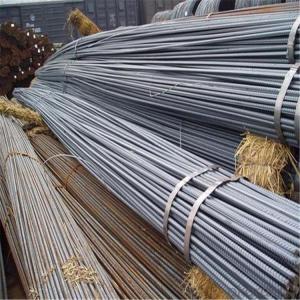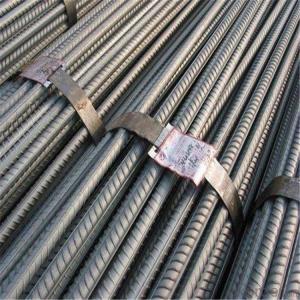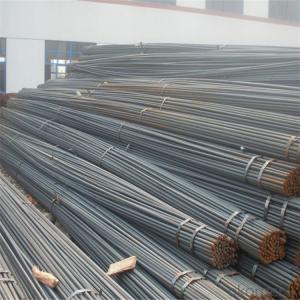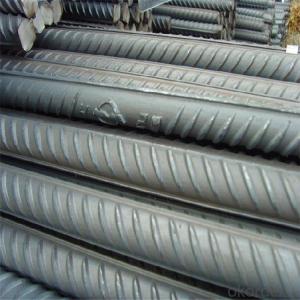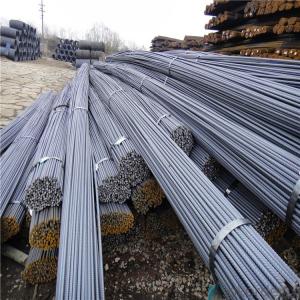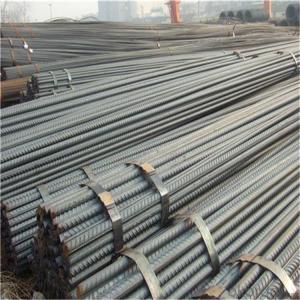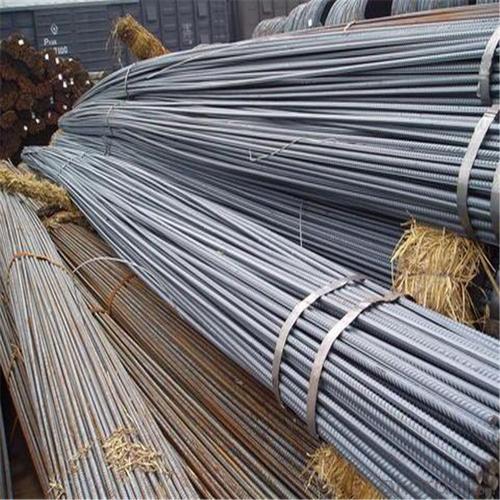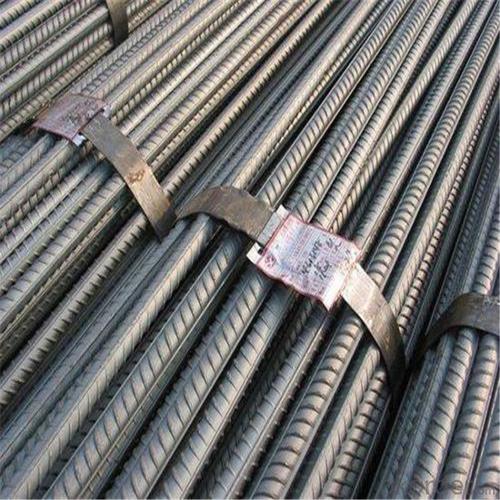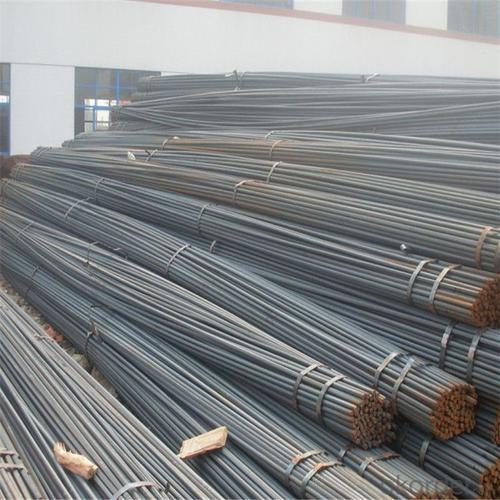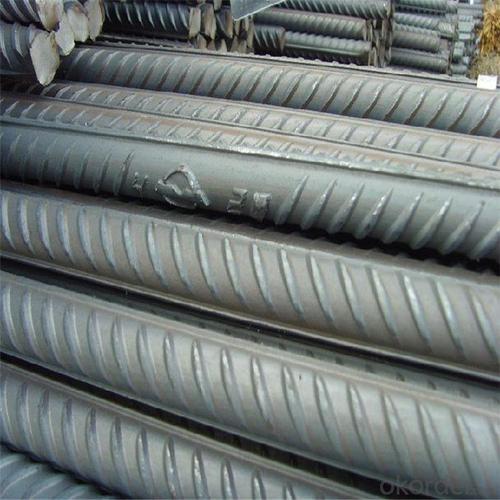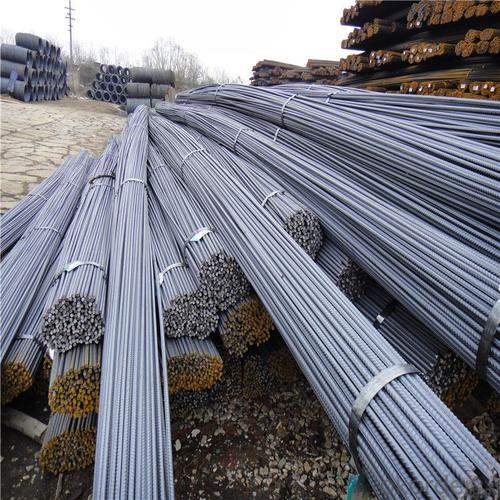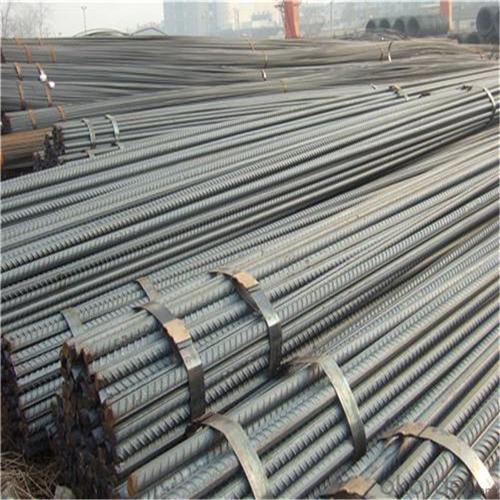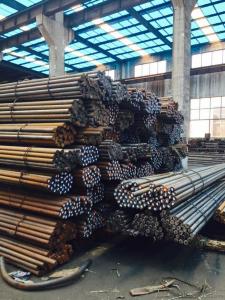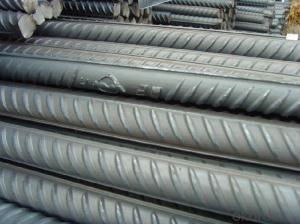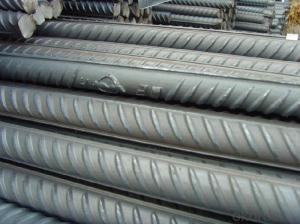HRB335 Steel Rebar Deformed Steel Bar
- Loading Port:
- Tianjin
- Payment Terms:
- TT OR LC
- Min Order Qty:
- 120 m.t.
- Supply Capability:
- 50000 m.t./month
OKorder Service Pledge
OKorder Financial Service
You Might Also Like
Specification
HRB335 Steel Rebar Deformed Steel Bar
Description of HRB335 Steel Rebar Deformed Steel Bar
1, Diameter: 5.5mm-10mm HRB335 Steel Rebar Deformed Steel Bar
10m- 40mm HRB335 Steel Rebar Deformed Steel Bar
2, Length: 6m, 9m, 12m or customized
3, Standard: GB, ASTM, AISI, SAE, DIN, JIS, EN
2, Produce Process: hot rolled or forged to get the steel round bar and plate
3, Heat Treatment: annealing, normalizing, tempering, quenching
4, Surface Treatment: Black
5, Quality Assurance: We accept third party inspection for all orders.
Chemical Composition of HRB335 Steel Rebar Deformed Steel Bar
Grade | Technical data of the original chemical composition(%) | |||||
Reinforcing steel bar HRB335 | C | Mn | Si | S | P | B |
≤0.25 | ≤1.60 | ≤0.80 | ≤0.045 | ≤0.045 | >0.0008 | |
Physics Capability | ||||||
Yield Strength(N/cm2) | Tensile Strength(N/cm2) | Elongation(%) | ||||
≥ 335 | ≥490 | ≥16 | ||||
Reinforcing steel bar HRB400 | C | Mn | Si | S | P | B |
≤0.25 | ≤0.16 | ≤0.80 | ≤0.045 | ≤0.045 | 0.04-0.12 | |
Physics Capability | ||||||
Yield Strength(N/cm2) | Tensile Strength(N/cm2) | Elongation(%) | ||||
≥ 400 | ≥ 570 | ≥ 14 | ||||
Products Show of HRB335 Steel Rebar Deformed Steel Bar
Company Information
CNBM International Corporation is the most important trading platform of CNBM group.
Whith its advantages, CNBM International are mainly concentrate on Cement, Glass, Iron and Steel, Ceramics industries and devotes herself for supplying high qulity series of refractories as well as technical consultancies and logistics solutions.


F A Q
1, Your advantages?
professional products inquiry, products knowledge train (for agents), smooth goods delivery, excellent customer solution proposale
2, Test & Certificate?
SGS test is available, customer inspection before shipping is welcome, third party inspection is no problem
3, Factory or Trading Company?
CNBM is a trading company but we have so many protocol factories and CNBM works as a trading department of these factories. Also CNBM is the holding company of many factories.
4, Payment Terms?
30% TT as deposit and 70% before delivery.
Irrevocable L/C at sight.
5, Trading Terms?
EXW, FOB, CIF, FFR, CNF
6, After-sale Service?
CNBM provides the services and support you need for every step of our cooperation. We're the business partner you can trust.
For any problem, please kindly contact us at any your convenient time.
We'll reply you in our first priority within 24 hours.
- Q: How does special steel contribute to the waste management industry?
- Special steel contributes to the waste management industry in various ways. Its exceptional strength, durability, and resistance to corrosion make it ideal for manufacturing equipment used in waste management processes. Special steel is extensively used in the construction of waste sorting systems, recycling machinery, and waste containers, ensuring their longevity and reliability. Additionally, special steel can be recycled itself, reducing the environmental impact of waste management operations and promoting sustainability in the industry.
- Q: What are the specific requirements for special steel used in the nuclear fuel industry?
- The specific requirements for special steel used in the nuclear fuel industry include high resistance to corrosion and radiation, exceptional strength and toughness, low thermal expansion, and the ability to withstand high temperatures. Additionally, the steel must meet stringent quality control standards, have excellent weldability, and maintain its integrity over extended periods of time to ensure the safety and efficiency of nuclear fuel operations.
- Q: How does special steel perform in cryogenic strength?
- Special steel is known for its excellent performance in cryogenic strength. Cryogenic strength refers to the ability of a material to withstand extremely low temperatures without losing its mechanical properties. Special steels, such as stainless steels and nickel-based alloys, are specifically engineered to exhibit exceptional strength, toughness, and resistance to cracking at cryogenic temperatures. The unique composition and microstructure of special steel allow it to maintain its structural integrity and mechanical properties even in extreme cold conditions. These materials are designed to withstand the thermal stresses and brittleness that can occur at cryogenic temperatures, ensuring their reliability and performance in various applications. Special steel's ability to perform well in cryogenic strength is crucial in industries such as aerospace, energy, and gas processing, where components are exposed to extremely low temperatures. For example, in the aerospace industry, special steel is used in the construction of cryogenic fuel tanks and rocket engines, where it must withstand the extreme cold of space. Furthermore, special steel's cryogenic strength is also beneficial in applications like liquefied natural gas (LNG) storage and transportation. The low temperatures involved in LNG processes require materials that can handle the thermal stresses and maintain their strength and toughness. In summary, special steel exhibits exceptional performance in cryogenic strength due to its unique composition and microstructure. Its ability to withstand extremely low temperatures without losing mechanical properties makes it a reliable choice for applications in industries where cryogenic conditions are present.
- Q: How does special steel perform in extreme cold temperatures?
- Special steel performs well in extreme cold temperatures due to its high strength and resistance to brittleness. It retains its mechanical properties, such as toughness and ductility, which allows it to withstand low temperatures without cracking or breaking. Additionally, special steel often possesses low thermal conductivity, which helps it maintain its structural integrity and prevents it from becoming brittle in extremely cold environments.
- Q: How does special steel perform in cryogenic applications?
- Special steel performs well in cryogenic applications due to its ability to maintain its mechanical properties at extremely low temperatures. It has a low thermal expansion coefficient, high strength, and excellent toughness, which are essential characteristics for withstanding the extreme conditions of cryogenic environments. Additionally, special steel exhibits good resistance to corrosion and oxidation, making it suitable for use in cryogenic applications where exposure to low temperatures and cryogenic fluids is common.
- Q: What are the different construction grades of special steel?
- There are several different construction grades of special steel, including but not limited to ASTM A36, ASTM A572, ASTM A514, and ASTM A588. These grades vary in their mechanical properties and are specifically designed to meet different construction requirements, such as strength, durability, or corrosion resistance.
- Q: How is special steel tested for quality control?
- Special steel is tested for quality control through various methods such as chemical analysis, mechanical testing, non-destructive testing, and visual inspection. These tests ensure that the steel meets specific standards for composition, strength, toughness, and other properties. Additionally, special steel may undergo heat treatment and surface treatment tests to ensure its performance and durability.
- Q: Are there any disadvantages of using special steel?
- Yes, there are some disadvantages of using special steel. Firstly, special steel is generally more expensive than regular steel. The production process of special steel involves additional alloying elements and heat treatments, which contribute to the higher cost. This can make it less economical for certain applications where cost is a major consideration. Secondly, special steel may have limited availability compared to regular steel. Special steel grades are often produced in smaller quantities and may only be available from specific suppliers. This can lead to longer lead times and difficulties in sourcing the required quantity of special steel, especially for large-scale projects. Additionally, the increased complexity of special steel can make it more difficult to work with. Special steel may require specialized knowledge, skill, and equipment to handle and process. This can lead to higher manufacturing costs and potential production delays if the necessary expertise or resources are not readily available. Furthermore, the high strength and hardness of some special steel grades can make them more prone to brittleness. This means that special steel may be more susceptible to cracking or breaking under certain conditions, especially when subjected to extreme temperatures or sudden impact loads. This can be a drawback in applications that require high toughness or resistance to fracture. Lastly, special steel may have limited applications due to its specific properties. While it offers enhanced characteristics such as corrosion resistance, high temperature resistance, or improved mechanical properties, these advantages may not be relevant or necessary for every application. In such cases, using special steel may be an unnecessary expense without any tangible benefits. In conclusion, special steel has its drawbacks, including higher costs, limited availability, increased complexity, potential brittleness, and limited applicability. Therefore, careful consideration should be given to the specific requirements of the project before opting for special steel.
- Q: How does special steel contribute to product innovation?
- Special steel contributes to product innovation in several ways. Firstly, special steel offers enhanced mechanical properties such as high strength, hardness, and wear resistance. This allows designers and engineers to create innovative products that can withstand higher stresses, operate in extreme conditions, and have improved longevity. For example, special steel is commonly used in the aerospace industry to manufacture lightweight yet strong components that increase fuel efficiency and improve overall aircraft performance. Additionally, special steel can be tailored to have specific characteristics such as corrosion resistance, heat resistance, or magnetic properties. This enables the development of innovative products that can operate in challenging environments, such as marine structures, power plants, or electronic devices. For instance, special stainless steel alloys are extensively used in the medical field to produce implants and surgical instruments that are biocompatible, durable, and resistant to harsh sterilization processes. Furthermore, special steel can be manufactured with precise dimensions and tolerances, allowing for intricate and complex designs. This promotes product innovation by enabling the creation of intricate components, such as gears, bearings, or turbine blades, that require high precision and reliability. These advanced designs can improve the efficiency, performance, and overall functionality of various products, ranging from automotive engines to wind turbines. Moreover, the versatility of special steel enables it to be combined with other materials, such as polymers or composites, to create hybrid products with unique properties. This opens up possibilities for innovation in various industries, including automotive, construction, and consumer electronics. For example, special steel-reinforced concrete structures can be more robust and durable, while special steel-reinforced polymers can improve the strength and impact resistance of lightweight components. In conclusion, special steel contributes to product innovation by providing enhanced mechanical properties, tailored characteristics, precise dimensions, and the ability to be combined with other materials. These capabilities empower designers and engineers to create innovative products that have improved performance, durability, and functionality, leading to advancements in various industries.
- Q: How does special steel perform in high-stress applications?
- Special steel performs exceptionally well in high-stress applications. Its unique composition and properties, such as high strength, toughness, and resistance to wear and corrosion, enable it to withstand extreme conditions and heavy loads without compromising its structural integrity. This makes special steel an ideal choice for demanding industries like aerospace, automotive, and construction, where durability and reliability are crucial.
Send your message to us
HRB335 Steel Rebar Deformed Steel Bar
- Loading Port:
- Tianjin
- Payment Terms:
- TT OR LC
- Min Order Qty:
- 120 m.t.
- Supply Capability:
- 50000 m.t./month
OKorder Service Pledge
OKorder Financial Service
Similar products
Hot products
Hot Searches
Related keywords
